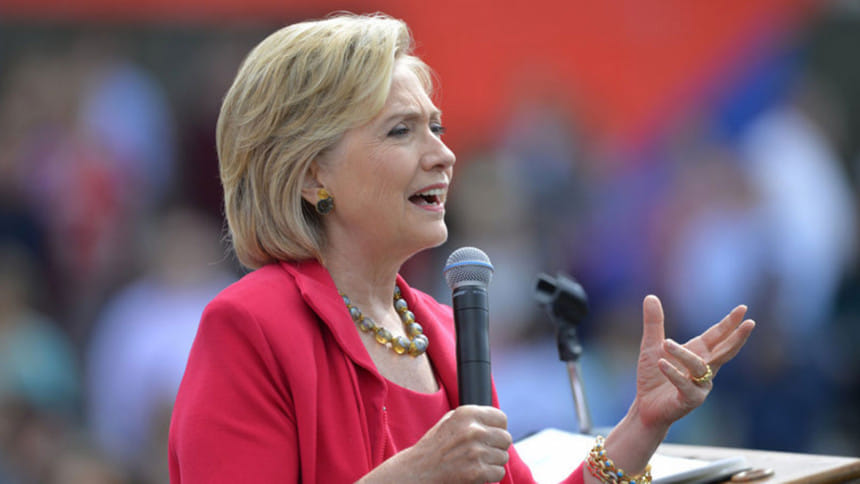Latest Clinton emails show frustrations at State with email

Aides to Hillary Rodham Clinton at the State Department complained about the limitations of using email to discuss sensitive diplomatic information, according to the latest batch of emails released by the agency from Clinton's tenure as secretary of state.
The State Department made public roughly 7,121 pages of Clinton's emails late Monday night, including 125 emails that were censored prior to their release because they contain information now deemed classified.
Among them are emails from federal employees noting the constraints of discussing sensitive subjects outside of the government's secure messaging systems.
Senior adviser Alec Ross, in a February 2010 email intended for Clinton, cited "the boundaries of unclassified email" in a message about an unspecified country, which Ross referred to as "the country we discussed."
The email appears to focus on civil unrest in Iran during the period preceding the Green Movement, when Iranian protesters used social media and the Internet to unsuccessfully challenge the re-election of then-President Mahmoud Ahmadinejad.
Ross's email proposed circumventing Iranian government-imposed firewalls and using technology to enable better communications between resistance organisers and protest participants.
Government employees are instructed not to paraphrase or repeat in any form classified material in unsecured email, which includes both the official state.gov email system and the private server that Clinton set up at her home to use while serving as the nation's top diplomat.
In total, the State Department has now released 13,269 pages of Clinton's emails, more than 25 percent of the total that she turned over from her private server, said department spokesman Mark Toner.
Clinton provided the department some 30,000 pages of emails she classified as work-related late last year, while deleting a similar amount from her server because she said they were solely personal in nature.
Toner said none of the censored information was identified as classified when the emails were sent or received by Clinton, noting the redactions were made subsequently and only prior to the release of the emails under the Freedom of Information Act.
However, the Democratic presidential front-runner now says her decision to use a personal email account to conduct government business was a mistake, and government inspectors have pointed to exchanges they said should not have been sent via such an unsecured channel.
Clinton's use of her own private email may have also created logistical problems communicating with State Department aides.
After Clinton aide Lauren Jiloty, who used an official State Department email address, missed some emails, a top aide mused that the conflicting systems were part of the problem.
"Well its clearly a state vs outside email issue," Huma Abedin, who also had an address on the private server, wrote to Clinton on Aug 24, 2010. "State has been trying to figure it out. So lj is getting all your emazils cause she's on her personal account too."
Despite her approving the creation of a relatively complex email system in her home, Clinton seemed puzzled by basic technology. An exchange with former staffer Phillippe Reines on July 24, 2010, had the subject line "I-Pad Questions." Clinton's questions include how to charge the Apple tablet and how to update a news reader app.
Reines asks Clinton if she has a wireless Internet connection, and she replies: "I don't know if I have wi-fi. How do I find out?"
A few of the messages released Monday hint at the ways former President Bill Clinton was involved in his wife's work at the agency.
Following the devastating Haiti earthquake in January 2010, Clinton wrote about her efforts to involve Bill Clinton in the disaster response.
After an unnamed party assumed that former President Clinton's preexisting role as a United Nations envoy to Haiti would sideline him from the reconstruction effort, Hillary stepped in.
"I just spent an extra hour explaining the architecture" of the relief organizations, Clinton wrote. "Will fill wjc in on the plane." Bill Clinton, who is often referred to by his initials "WJC," ended up as co-chairman of the Interim Haiti Recovery Commission, a body with significant power over reconstruction funds.
A few months later, in the spring of 2010, some of Clinton's longtime allies were floating the possibility of a 2016 presidential bid. Roy Spence, a Texas advertising executive who worked with Clinton during her 2008 campaign for president, sent Clinton a blog item that pointed to her popularity as secretary of state and noted that by 2016 she would be slightly younger than Ronald Reagan was when he ran for president in 1980.
"Some have said that, in choosing Joe Biden as Vice-President, Barack Obama did not pick a successor to lead the Democratic Party," the blog post by Chris Bowers on openleft.com read. "However, that needs rethinking. Because Barack Obama made her Secretary of State, Hillary Clinton remains remarkably well-positioned to run for President in 2016, even more so than she was in 2008."
"Anyway, have a good holiday weekend," Spence wrote, attaching his typical sign-off: "Ride at dawn."
The emails also illustrate the wide reach of Clinton's political relationships. A December 2010 note from Abedin alerts Clinton to a call from then-Senate Minority Leader Mitch McConnell, a staunch opponent of the president. Another note from Clinton, with the subject "John Kerry's birthday," asks that the Massachusetts senator and future Secretary of State be added to that day's call list.
An email from Clinton to Maryland Sen. Barbara Mikulski asks after "our friend, Martin" — a reference to then-Maryland Gov. Martin O'Malley, who is now challenging Clinton for their party's presidential nomination.
"He should be reelected by acclamation for steering the ship of state so well. Pls give him my best wishes," wrote Clinton.

 For all latest news, follow The Daily Star's Google News channel.
For all latest news, follow The Daily Star's Google News channel. 



Comments